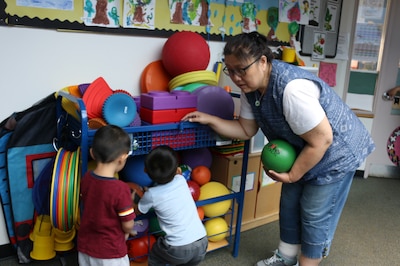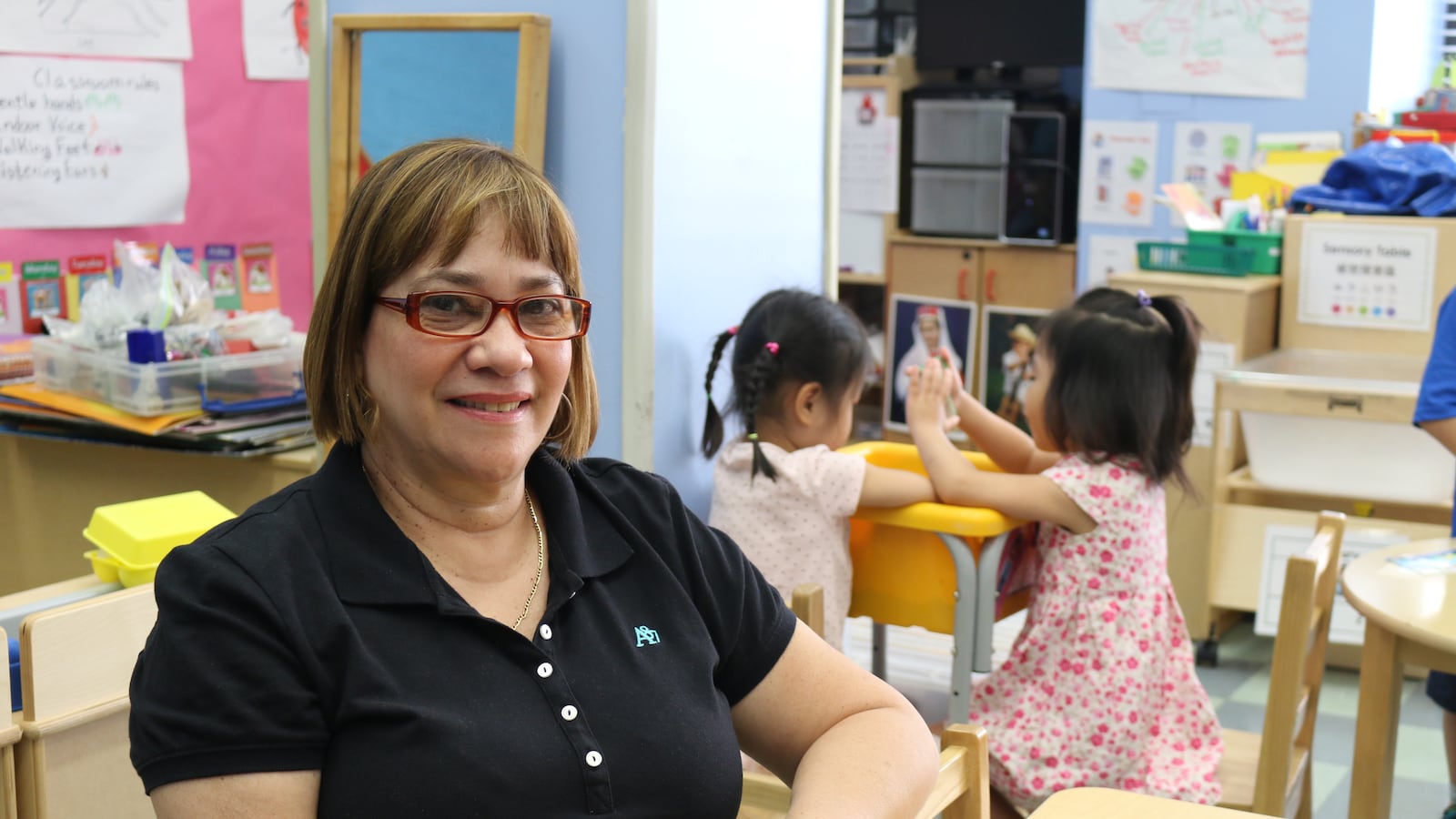On a recent morning in Chinatown, Ivett Merlano led a group of giggling toddlers as they marched and raised their arms rhythmically to a counting song. She would spend the next several hours at CPC Chung Pak daycare monitoring lunch, herding students to play centers, wiping little noses, and leading story time — all of the regular tasks that are part of a preschool teacher’s day.
Except Merlano doesn’t have an advanced degree and isn’t certified, so she makes little more than minimum wage as a teacher’s assistant.
This Thursday, she’ll have the chance as a member of District Council 1707’s Local 205 to vote on a labor agreement that would provide her with a bonus and modest raises over the next three years. But she plans on voting no.
While the proposal could shower significant raises on teachers with master’s degrees and certification, Merlano said it doesn’t do enough for support workers like her and her colleagues who work at community-based preschools that are publicly funded but independently run.
“They’re not doing the right thing for everybody,” Merlano said. “We work hard like the other teachers, and why don’t we have the same salary and pension, vacation, everything?”
City officials and labor leaders were triumphant when they announced the tentative agreement in early July, hailing it as a “pathway to pay parity” that would finally bring the compensation of community-based teachers in line with starting salaries for their counterparts in public schools. That pay gap had pushed union members to the brink of a strike earlier this year.
For about 300 lead teachers, ratification would mean a significant win: they will earn up to $20,000 more over the three-year agreement.
“This is a profound moment,” Mayor Bill de Blasio said when the deal was first proposed.
But another 900 classroom aides and assistant teachers, plus 3,000 support staff, including cooks, janitors, and bookkeepers, will see a far less generous boost.
Under the proposed agreement, those members would receive a one-time bonus of $1,800 and wage increases of 2.75% a year. The union and city have also sweetened the proposal with promised “significant” reductions in healthcare co-pays and a 10% decrease in co-premiums, savings that apply to all members.
The union has touted the proposal as “historic” and making “strides” for members — so much so, it has convinced some centers that previously were not unionized to join DC 1707. Labor leaders have been busy visiting sites across the city and phone banking to drum up support, and have often highlighted the needs of their support staffers when making their case.
“Of course, everyone should be recognized for the work that they do and be respected,” Kim Medina, executive director of DC 1707, said at a recent press conference. “With this, it was not just the teachers, it was everybody that was included.”
The agreement is not a new contract but an extension of the current one, timed to expire at the same time as the labor agreement between the city and the powerhouse United Federation of Teachers, the largest local in the country. DC 1707 would then be well-positioned to benefit from any precedent of bigger gains the UFT negotiates with the city.
“As always, the deal is subject to the union’s ratification process, and each individual will have the ability to be heard,” city spokeswoman Laura Feyer wrote in an email. “We look forward to the vote and to addressing the recruitment and retention issues in this incredibly important sector.”
Even if the extension passes, however, a current of dissatisfaction may remain among some of those charged with making the mayor’s signature education achievement a reality. This week, de Blasio touted the city’s expansion of free pre-K as a centerpiece of his long-shot run for the White House, saying affordable childcare is a needed “redistribution” of wealth benefiting underserved communities.
His focus on equity has come under criticism from some teachers — mostly women of color, a bedrock of the Democratic base — who work in the community-based centers and have earned far less than their public school counterparts, who are mostly white.
“I’m ashamed to say I make exactly the same as high school students who work in fast food,” said Lisa Zhang, who fills two part-time roles, as a classroom aide and clerical worker, at Chung Pak. Though she’s deeply committed to working with young children, at 27, Zhang wants to be able to move out of her mother’s home. She’ll be voting no.
The staffers at Chung Pak represent just one site out of hundreds that belong to the union, but a down vote would not be unprecedented. In 2016, members rejected a contract they said was not generous enough, forcing city leaders to cancel a celebratory press conference.
Assistant teacher Tai Bo Wong wishes the fight for pay parity would extend to all the workers who make a preschool possible and run well. After more than two decades in the classroom, Wong said she still makes just $15.30 an hour and works year-round.

Pre-K advocates hope the dramatic raises for certified teachers will stem the churn of teachers who leave community organizations for bigger paychecks in public schools — and also encourage assistant teachers like Wong to earn the credentials needed to lead their own classrooms.
Wong has started to take university courses toward her degree with the help of a union program. But she’s taking just one class a semester, finding it hard to juggle full-time work with night courses and caring for her elderly mother. Wong is planning to vote to reject the proposal.
“I want them to fight for more,” she said. “Everyone thinks it’s a lot of money. It’s nothing.”
Merlano, the assistant teacher who led her toddler class in song, said the union should demand better benefits beyond pay, such as more paid leave for programs like hers that don’t break for the summer, making it hard for her to visit family in Colombia or ever rejuvenate.
“It’s difficult to work with children all day long,” she said. “Sometimes my back hurts a lot. My knee.”
Whether the contract extension passes or not, the education department will be responsible for addressing any rifts among teachers and staffers in community organizations.
Until recently, Programs like Chung Pak were overseen by the Administration for Children’s Services, but that has shifted to the education department. In doing so, the city is aiming to create a seamless system of care and ensure quality across the board, while acknowledging that children begin learning from a very early age.
For educators, though, the switch in oversight has only served to highlight the inequities that many see in how preschool programs in public schools and community centers are funded and how their staff is paid.
Mary Sikarevich, the director of Chung Pak Daycare, said a truly unified system will have to wrestle with wide differences in not only paychecks, but also working hours and benefits like health care costs, compared to public school staffers.
“We do exactly what they do, and yet…” she trailed off. “There’s no parity. None whatsoever.”
Correction: A previous version of this article incorrectly stated when the transfer of early childhood programs to the education department occurred.

